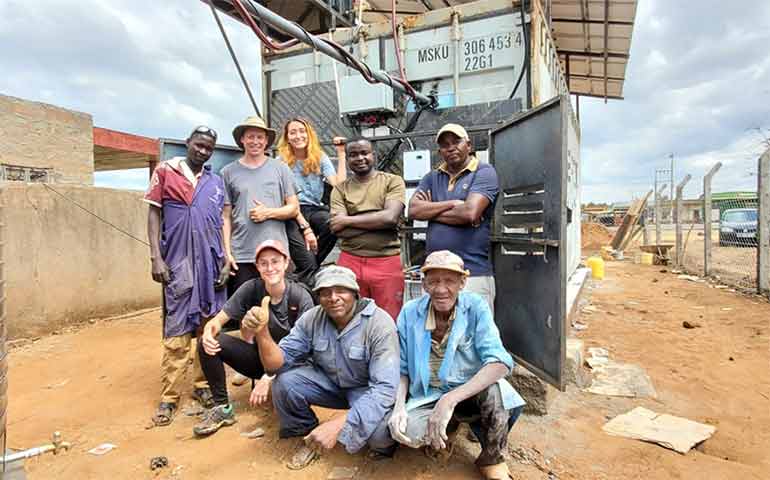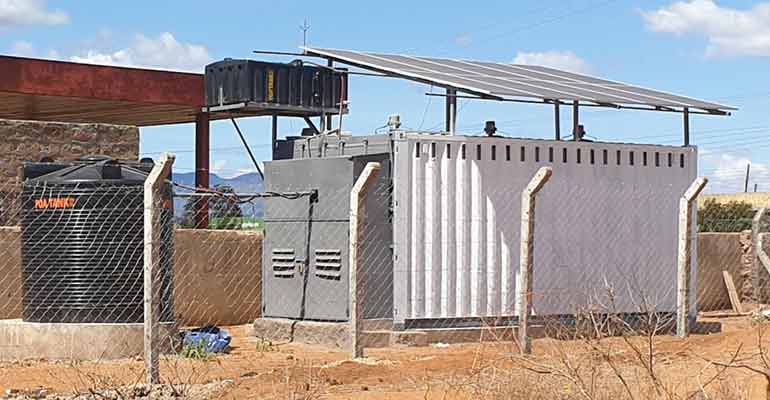Cost-effective produce cooling in arid regions
29th July 2023
USA: Researchers at MIT have developed a cost-effective forced-air evaporative cooling system in a used shipping container for preserving fruit and vegetables in arid regions.
Released as an open-source design, the chamber, which can be powered by either grid electricity or built-in solar panels, is said to offer great promise for smallholder farmers in hot, dry climates who need an affordable method for quickly bringing down the temperature of freshly harvested fruit and vegetables.
The idea of using forced, instead of passive, airflow to cool fruit and vegetables came together through collaboration between Leon Glicksman of the Massachusetts Institute of Technology Building Technology Programme within the Department of Architecture, and research engineer Eric Verploegen of MIT D-Lab.
After studying existing cold storage options and conducting user research with farmers in Kenya, they came up with the idea to use active evaporative cooling within a used shipping container.
Fans draw hot, dry air through a porous wet pad into the chamber, which has a capacity of 168 produce crates. The resulting cool and humid air is then forced through the crates of fruits and vegetables. The air is then directed through the raised floor and to a channel between the insulation and the exterior container wall, where it flows to the exhaust holes near the top of the side walls.
The vertical forced-air design pattern dress on previous work by Leon Glicksman, a professor of building technology and mechanical engineering, researching natural ventilation and airflow in buildings.

“The key to the design is the close control of the airflow strength, and its direction,” he says in a report on the University’s website. “The strength of the airflow passing directly through the crates of fruits and vegetables, and the airflow pathway itself, are what makes this system work so well. The design promotes rapid cooling of a harvest taken directly from the field.”
Whether connected to the electrical grid or run from solar panels, the forced-air chamber consumes one-quarter the power of refrigerated cold rooms. And, as the chamber is designed to be built in a used shipping container, the project is seen as a great example of up-cycling.
Pilot and testing
Verploegen, Glicksman and their colleagues have worked closely with farmers and community members. Two partners, one in Kenya and one in India, each built a pilot chamber, testing and informing the process alongside the work being done at MIT.
In Kenya, where smallholder farms produce 63% of total food consumed and over 50% of smallholder produce is lost post-harvest, they worked with Solar Freeze, a cold storage company located in in Kibwezi, Kenya. Solar Freeze, whose founder Dysmus Kisilu was a 2019 MIT D-Lab Scale-Ups Fellow, built an off-grid forced-air evaporative cooling chamber powered by solar photovoltaic panels at a produce market between Nairobi and Mombasa at a cost of $15,000.
Although the climate varies across the subcontinent, the hot desert climate places such as Bhuj in India, where the Hunnarshala Foundation is headquartered, is perfect for evaporative cooling.
Hunnarshala signed on to build an on-grid system for $8,100, which they located at an organic farm near Bhuj. According to Mahavir Acharya, executive director of Hunnarshala Foundation, encouraging results were achieved. “In peak summer, when the temperature is 42º [C] we are able to get to 26º inside and 95% humidity, which is really good conditions for vegetables to remain fresh for three, four, five, six days. In winter we tested [and saw temperatures reduced from] 35º to 24º [C], and for seven days the quality was quite good.”
“We will continue piloting with users and deploying with farmers and vendors, gathering data on the thermal performance, the shelf life of fruits and vegetables in the chamber, and how using the technology impacts the users,” said Verploegen. “And, we’re also looking to engage with cold storage providers who might want to build this or others in the horticulture value chain such as farmer cooperatives, individual farmers, and local governments.”
Open-source
To reach the widest number of potential users, Verploegen and the team chose not to pursue a patent and instead set up a website to disseminate the open-source design with detailed guidance on how to build a forced-air evaporative cooling chamber
The forced-air evaporative cooling chamber research and design have been supported by the Abdul Latif Jameel Water and Food Systems Lab through an India Grant, Seed Grant, and a Solutions Grant.







